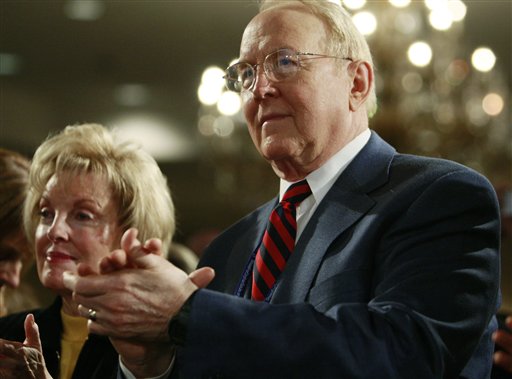In Lamb’s Chapel v. Center Moriches Union Free School District, 508 U.S. 384 (1993), the speech and religion provisions of the First Amendment intersected as the Supreme Court unanimously held that religious meetings where religious films are shown can take place on public school property during nonschool hours.
New York prohibited public school property from being used for religious purposes
At issue was a New York law that prohibited public school property from being used for religious purposes, even during nonschool hours.
Lamb’s Chapel, an evangelical church, sought to show a film series produced by James Dobson of the Christian group Focus on the Family. The films depicted family issues from a Christian perspective.
Although the school district allowed nonreligious groups to use its facilities, the school district denied Lamb’s Chapel’s request. Lamb’s Chapel lost at both the federal district and appeals court levels, but the Supreme Court overturned the lower courts’ rulings.
Court overturned law on First Amendment grounds
Writing for the Court, Justice Byron R. White explained that banning religious groups but allowing other groups was an unconstitutional content-based restriction on speech and expression.
Furthermore, White said that showing a religious film at the meetings did not violate any of the three prongs of the Lemon test, first articulated by Chief Justice Warren E. Burger in the case of Lemon v. Kurtzman (1971), because the action “has a secular purpose, does not have the principal or primary effect of advancing or inhibiting religion, and does not foster an excessive entanglement with religion.”
Court said allowing church group would not violate establishment clause
In a nod to Justice Sandra Day O’Connor’s reformulated second prong of the Lemon test, White said that because all groups were allowed access, there was no realistic danger that the community would think the school district was “endorsing religion.”
In a separate concurring opinion, Justice Antonin Scalia agreed that the meetings and films were permissible but lamented the Court’s use of the Lemon test. Comparing it to “some ghoul in a late-night horror movie that repeatedly sits up in its grave and shuffles abroad,” Scalia said, “Lemon stalks our Establishment Clause jurisprudence once again, frightening little children and school attorneys. . .” He called for the test’s death and specifically criticized Justices White, O’Connor, and Anthony M. Kennedy for seemingly repudiating it in past cases only to use it again.
Court has moved to acommodationist view of religion
Although the Court ruled on free speech grounds, the case epitomized the Court’s increasingly accommodationist stance toward cases that raised establishment issues under Chief Justice William H. Rehnquist, in sharp contrast to the more separationist decisions of the Earl Warren and Warren E. Burger courts.
The Court relied on Lamb’s Chapel to allow a Christian group of students to meet at a public secondary school after school hours in Good News Club v. Milford Central School (2001). The Court again determined that the exclusion of a religious group violated its free speech rights.
This article was originally published in 2009. Artemus Ward is professor of political science faculty associate at the college of law at Northern Illinois University. Ward received his Ph.D. from the Maxwell School of Citizenship & Public Affairs at Syracuse University and served as a staffer on the House Judiciary Committee. He is an award-winning author of several books of the U.S. Supreme Court and his research and commentary have been featured in such outlets as the New York Times, Los Angeles Times, Associated Press, NBC Nightly News, Fox News, and C-SPAN.

